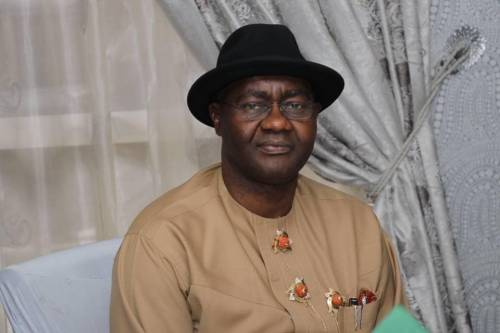The representative of Rivers Southeast Senatorial District in the 7th and 8th Senate, Magnus Abe, has lamented that miseries, humiliations and attacks have been his lot in the All Progressives Congress (APC), which he said he and others put their lives on the line to birth in Rivers State.
He also disclosed that he was facing oppression at the hands of the friend (name not disclosed), for whose sake he wept on the floor of the Senate, but apparently referring to Transportation Minister, Rotimi Amaechi, a former Rivers governor, who is the leader of APC in the state and South-south zone, during his first ministerial screening.
The senator, in a statement on his Facebook wall, said: “I have chosen not to be bitter towards anyone and not to teach bitterness to anyone. I know that if I teach people that Mr. A is the source of every failure and poverty, I will absolve myself and those I teach of all responsibility for whatever challenges and the difficulties that they are going through, then I can be a super leader, because I have provided a convenient scapegoat and I can absolve myself from scrutiny responsibility.
“Whether it is the South African leaders telling their people that it is the fault of foreign nationals that they are poor or white people in the United States saying Mexicans and immigrants are coming to steal their country, the end result is always the same: bitterness, violence, misery, failure and more poverty.
“In my world, bitterness towards anyone is a sign of failure. It means you admit that the other person has the power to make your life. No one has that power over my life.
“Rather than tell my supporters of all the miseries, humiliations and attacks that have been my lot in the APC, the party that we put our lives on the line to birth in Rivers State, rather than tell them about the oppression I am facing at the hands of the friend for whose sake I wept on the floor of the Senate of the Federal Republic of Nigeria. I tell them that their life is their responsibility and that no man can alter their destinies. It is our responsibility to identify what we want, where we need to be and how we can get there. I tell them to come and let us move mountains, if need be.
“We will enjoy our journey, as challenging as it may be and we will not just travel hopefully, but we will get there. I do not know your destination, but I know that the ultimate objective of bitterness is violence. No amount of violence can help you, if you do not know where you are going.”
Abe, a former Secretary to the Rivers State Government (SSG), when Amaechi was governor, also recalled how a friend sent him a quote by Robert Louis Stevenson, stating that life is not a matter of holding good cards, but of playing a poor hand well.
He said: “No matter what anyone else may have done, we must start any honest and meaningful evaluation with ourselves. What did I do, what have I done and most importantly, what can I do better?
“Examining yourself honestly is not an automatic admission of failure; it is rather an opportunity to improve. Money is important, but leaders should not be judged only by how much money they can give.”
He also stated that he believe that inspiring people and motivating them to reach within themselves and not to focus on anyone else would give them the will to examine themselves and their leadership in the areas in which action or inaction could be reviewed and improved.
He noted that such model of leadership was difficult, tasking and could not provide leaders with docile followers, who would do whatever the leaders asked them to do, but would provide them with committed associates, who would understand exactly what was at stake.
Abe said: “They (the followers) cannot blame you (the leader) or blame anyone else, because they understand exactly where they are going, why it is important to go there and they know it is their responsibility to get there.
“Leadership which emphasises individual responsibility is tedious and painful, but ultimately it stands a chance of achieving what bitterness and scapegoating others will never achieve.
“It can actually help move the society in the direction of unity, peace, progress and prosperity. We must all realise our fallibility and the fact that no matter how good we may be, we can be better and no matter how well we have done, we can still do better.”


